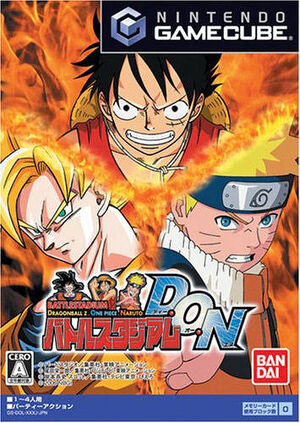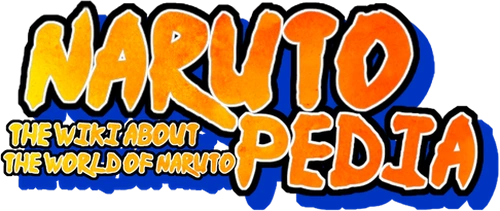Juni Sheen (talk | contribs) |
m (→Characters) Tags: Visual edit apiedit |
||
| (35 intermediate revisions by 21 users not shown) | |||
| Line 1: | Line 1: | ||
| + | {{Infobox/Naruto/VideoGame |
||
| − | {{Wikipedia}} |
||
| + | |top={{Wikipedia|Battle Stadium D.O.N|216050817}} |
||
| − | |||
| − | + | |image name=Battle Stadium DON.jpg |
|
| + | |english=Battle Stadium D.O.N |
||
| ⚫ | |||
| + | |unnamed=No |
||
| + | |kanji=バトルスタジアムDON |
||
| + | |romaji=Batoru Sutajiamu DON |
||
| + | |game system=GameCube, PlayStation 2 |
||
| + | |japanese release=July 20, 2006 |
||
| + | }} |
||
| ⚫ | |||
== Gameplay == |
== Gameplay == |
||
| − | Similar to the ''Super Smash Bros.'' series, the players are put onto either a moving or non-moving stage. Borrowing from ''Power Stone'', these stages have some level of interactivity. Players must then fight their opponents. Unlike other fighters, ''D.O.N'' uses a combined health gauge, that is, decreasing the health of one player will in turn increase the health of the other players. Thus, in order for one player to win a fight, they must make their own health bar take up the entire bar. As such, a fight can potentially last indefinitely if no time limit is set. Also, there are in game techniques that can be pulled off (ie. Kamehameha for Goku and Summoning |
+ | Similar to the ''Super Smash Bros.'' series, the players are put onto either a moving or non-moving stage. Borrowing from ''Power Stone'', these stages have some level of interactivity. Players must then fight their opponents. Unlike other fighters, ''D.O.N'' uses a combined health gauge, that is, decreasing the health of one player will in turn increase the health of the other players. Thus, in order for one player to win a fight, they must make their own health bar take up the entire bar. As such, a fight can potentially last indefinitely if no time limit is set. Also, there are in game techniques that can be pulled off (ie. Kamehameha for Goku and [[Summoning Technique]] for [[Naruto]]) and supers that can transform the characters into a new form (ie. Naruto's [[Rasengan]] turning him into the [[Nine-Tailed Demon Fox]] and Goku's Genki Dama turning him into Super Saiyan). In addition, some characters can induce a temporary transformation during the battle (ie. Sasuke's Sharingan and Luffy's Gear 2nd). |
=== Missions === |
=== Missions === |
||
| Line 15: | Line 22: | ||
== Characters == |
== Characters == |
||
| − | + | ;Dragon Ball Z |
|
| − | * Son |
+ | * [[w:c:dragonball:Goku|Son Gokū]] [Super Saiyan] ([[w:c:dragonball:Spirit Bomb|Spirit Bomb/Genki Dama]]; [[w:c:dragonball:Super Spirit Bomb|Super Spirit Bomb/Super Genki Dama]]) |
| − | * Teen Gohan [Super Saiyan] (Super Kamehameha) |
+ | * [[w:c:dragonball:Gohan|Teen Gohan]] [Super Saiyan] ([[w:c:dragonball:Super Kamehameha|Super Kamehameha]]) |
| − | * Piccolo (Hellzone Grenade) |
+ | * [[w:c:dragonball:Piccolo|Piccolo]] ([[w:c:dragonball:Hellzone Grenade|Hellzone Grenade]]) |
| − | * Future Trunks [Super Saiyan] (Shining Sword Slash) |
+ | * [[w:c:dragonball:Future Trunks|Future Trunks]] [Super Saiyan] ([[w:c:dragonball:Shining Sword Slash|Shining Sword Slash]]) |
| − | * Vegeta [Super Saiyan] (Final Flash) |
+ | * [[w:c:dragonball:Vegeta|Vegeta]] [Super Saiyan] ([[w:c:dragonball:Final Flash|Final Flash]]) |
| + | * [[w:c:dragonball:Frieza|Frieza]] ([[w:c:dragonball:Death Ball|Death Ball]]) |
||
| − | * Freeza (Death Ball) |
||
| + | * [[w:c:dragonball:Cell|Cell]] ([[w:c:dragonball:Super Kamehameha|Super Kamehameha]]) |
||
| − | * Cell (Super Kamehamaha) |
||
| − | * Majin Buu (Chocolate Beam) |
+ | * [[w:c:dragonball:Majin Buu|Majin Buu]] ([[w:c:dragonball:Chocolate Beam|Chocolate Beam]]) |
| − | + | ;One Piece |
|
| − | * Monkey D. Luffy [Gear Second] (Gomu Gomu No Hanabi/Gum Gum Fireworks) |
+ | * [[w:c:onepiece:Monkey D. Luffy|Monkey D. Luffy]] <nowiki>[</nowiki>[[W:c:Onepiece:Gomu Gomu no Mi/Gear Second Techniques|Gear Second]]<nowiki>]</nowiki> ([[W:c:Onepiece:Gomu Gomu no Mi/Techniques|Gomu Gomu No Hanabi/Gum Gum Fireworks]]) |
| − | * Roronoa Zoro (Santoryu Ogi: San-Zen-Se-Kai) |
+ | * [[w:c:onepiece:Roronoa Zoro|Roronoa Zoro]] ([[W:c:Onepiece:Santoryu|Santoryu Ogi: San-Zen-Se-Kai]]) |
| − | * Nami (Tornado Tempo) |
+ | * [[w:c:onepiece:Nami|Nami]] ([[W:c:Onepiece:Clima-Tact|Tornado Tempo]]) |
| − | * Usopp (Usopp Pound) |
+ | * [[w:c:onepiece:Usopp|Usopp]] ([[W:c:Onepiece:Usopp's Arsenal|Usopp Pound]]) |
| − | * Sanji (Mutton Shot) |
+ | * [[w:c:onepiece:Sanji|Sanji]] ([[W:c:Onepiece:Black Leg Style|Mutton Shot]]) |
| − | * Tony Tony Chopper (Kokutei Cross) |
+ | * [[w:c:onepiece:Tony Tony Chopper|Tony Tony Chopper]] ([[W:c:Onepiece:Hito Hito no Mi|Kokutei Cross]]) |
| − | + | ;Naruto |
|
| − | * [[Naruto Uzumaki]] [Nine-Tailed Fox Mode] (Rasengan) |
+ | * [[Naruto Uzumaki]] ([[Naruto Uzumaki's Jinchūriki Forms|Nine-Tailed Fox Mode]]) ([[Rasengan]]) |
| − | * [[Sasuke Uchiha]] [ |
+ | * [[Sasuke Uchiha]] ([[Cursed Seal]] Stage 1) ([[Chidori]]) |
| − | * [[Sakura Haruno]] (Inner Sakura Power) |
+ | * [[Sakura Haruno]] ([[Sakura Haruno#Inner Sakura|Inner Sakura Power]]) |
| − | * [[Kakashi Hatake]] [Sharingan] (Lightning Cutter) |
+ | * [[Kakashi Hatake]] ([[Sharingan]]) ([[Lightning Cutter]]) |
| − | * [[Rock Lee]] [ |
+ | * [[Rock Lee]] ([[Eight Gates|Fifth Gate]]) ([[Reverse Lotus]]) |
| − | * [[Gaara]] ( |
+ | * [[Gaara]] ([[Quicksand Waterfall Flow]]) |
[ ] = Burst Mode |
[ ] = Burst Mode |
||
| Line 45: | Line 52: | ||
== Stages == |
== Stages == |
||
| ⚫ | |||
| − | |||
| ⚫ | |||
* West City |
* West City |
||
* Planet Namek |
* Planet Namek |
||
| + | * Hyperbolic Time Chamber |
||
| − | * Room of Spirit and Time |
||
| − | * |
+ | * World Tournament Arena |
| − | + | ;One Piece |
|
* The Going Merry |
* The Going Merry |
||
* Baratie |
* Baratie |
||
* Giant Jack |
* Giant Jack |
||
| − | + | ;Naruto |
|
| + | * [[Konohagakure]] |
||
| − | * Hidden Leaf Village |
||
| − | * |
+ | * [[Valley of the End]] |
| − | * Forest of Death |
+ | * [[Forest of Death]] |
| − | + | ;Original |
|
* Battle Stadium |
* Battle Stadium |
||
Many of the stages have interactivity of some sort. Items and power-ups from each series are also found in the stages. |
Many of the stages have interactivity of some sort. Items and power-ups from each series are also found in the stages. |
||
| − | == |
+ | == Reception == |
| + | This game received a rating of 28/40 from Weekly Famitsu. |
||
| ⚫ | |||
| + | |||
| ⚫ | |||
| + | == See Also == |
||
| ⚫ | |||
| ⚫ | |||
| + | |||
| ⚫ | |||
| ⚫ | |||
| + | {{Games}} |
||
| ⚫ | |||
| ⚫ | |||
| − | *[http://www.siliconera.com/2006/07/31/battle-stadium-don/ Battle Stadium D.O.N. review] |
||
| − | *[http://www.the-magicbox.com/0604/game060417a.shtml The Magic Box: Battle Stadium D.O.N] |
||
| + | [[es:Battle Stadium D.O.N]] |
||
| − | [[Category:Video games]] |
||
Revision as of 08:00, 10 July 2015
| Battle Stadium D.O.N | |||
|---|---|---|---|
 | |||
| (バトルスタジアムDON, Batoru Sutajiamu DON) | |||
| Video game info | |||
| Playable on | GameCube, PlayStation 2 | ||
| Release Date | |||
| Japanese | July 20, 2006 | ||
| Debut | |||
| |||
| |||
Battle Stadium D.O.N is a Japanese fighting game for the GameCube and PlayStation 2 featuring characters from the popular anime and manga series Dragon Ball Z, One Piece, and Naruto, hence the D.O.N.
Gameplay
Similar to the Super Smash Bros. series, the players are put onto either a moving or non-moving stage. Borrowing from Power Stone, these stages have some level of interactivity. Players must then fight their opponents. Unlike other fighters, D.O.N uses a combined health gauge, that is, decreasing the health of one player will in turn increase the health of the other players. Thus, in order for one player to win a fight, they must make their own health bar take up the entire bar. As such, a fight can potentially last indefinitely if no time limit is set. Also, there are in game techniques that can be pulled off (ie. Kamehameha for Goku and Summoning Technique for Naruto) and supers that can transform the characters into a new form (ie. Naruto's Rasengan turning him into the Nine-Tailed Demon Fox and Goku's Genki Dama turning him into Super Saiyan). In addition, some characters can induce a temporary transformation during the battle (ie. Sasuke's Sharingan and Luffy's Gear 2nd).
Missions
The single player mode has the player fight through five rounds, 2 or 3 of which have missions with goals selected randomly. However, depending on the difficulty chosen by the player, different amounts of missions are given out with easy giving the least and very difficult giving out the most. Fulfilling the missions' goals rewards the player with coins that can be used in the slot machine available upon completing the fights. The slot machine is the way through which unlockables are obtained. There are also items which you can buy to help the characters in battle.
Multiplayer
Up to four players can participate in a multiplayer session, though a multitap must be used for more than two players for the PS2 version.
Characters
- Dragon Ball Z
- Son Gokū [Super Saiyan] (Spirit Bomb/Genki Dama; Super Spirit Bomb/Super Genki Dama)
- Teen Gohan [Super Saiyan] (Super Kamehameha)
- Piccolo (Hellzone Grenade)
- Future Trunks [Super Saiyan] (Shining Sword Slash)
- Vegeta [Super Saiyan] (Final Flash)
- Frieza (Death Ball)
- Cell (Super Kamehameha)
- Majin Buu (Chocolate Beam)
- One Piece
- Monkey D. Luffy [Gear Second] (Gomu Gomu No Hanabi/Gum Gum Fireworks)
- Roronoa Zoro (Santoryu Ogi: San-Zen-Se-Kai)
- Nami (Tornado Tempo)
- Usopp (Usopp Pound)
- Sanji (Mutton Shot)
- Tony Tony Chopper (Kokutei Cross)
- Naruto
- Naruto Uzumaki (Nine-Tailed Fox Mode) (Rasengan)
- Sasuke Uchiha (Cursed Seal Stage 1) (Chidori)
- Sakura Haruno (Inner Sakura Power)
- Kakashi Hatake (Sharingan) (Lightning Cutter)
- Rock Lee (Fifth Gate) (Reverse Lotus)
- Gaara (Quicksand Waterfall Flow)
[ ] = Burst Mode ( ) = Special Attack
Stages
- Dragon Ball Z
- West City
- Planet Namek
- Hyperbolic Time Chamber
- World Tournament Arena
- One Piece
- The Going Merry
- Baratie
- Giant Jack
- Naruto
- Original
- Battle Stadium
Many of the stages have interactivity of some sort. Items and power-ups from each series are also found in the stages.
Reception
This game received a rating of 28/40 from Weekly Famitsu.

